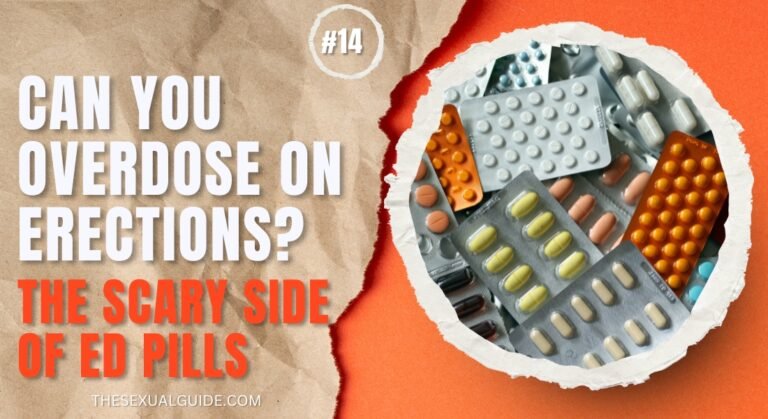Sexuality is a topic surrounded by numerous myths and misconceptions, many of which can lead to misunderstandings and unhealthy attitudes toward sex.
In this article, we’ll debunk some of the most common sex myths, providing clarity and promoting a healthier perspective on sexual health.
Myth 1: Erectile Dysfunction Only Affects Older Men
Fact: While it’s true that the prevalence of erectile dysfunction (ED) increases with age, younger men are not immune.
Studies have shown that approximately 25% of men seeking medical help for ED are under the age of 40.
Factors such as stress, anxiety, and lifestyle choices can contribute to ED in younger men.
Key Takeaway: ED can affect men of all ages. If you’re experiencing symptoms, consult a healthcare professional regardless of your age.
Myth 2: You Can’t Get Pregnant During Your Period
Fact: Although the likelihood is lower, it’s still possible to conceive during menstruation.
Sperm can survive in the female reproductive tract for up to five days, and if ovulation occurs shortly after your period, pregnancy can result from intercourse during menstruation.
Key Takeaway: Always use contraception if you’re not planning to become pregnant, regardless of the timing within your menstrual cycle.
Myth 3: Erectile Dysfunction Is Purely Psychological
Fact: While psychological factors like stress and anxiety can contribute to ED, physical conditions such as heart disease, diabetes, and hormonal imbalances are often underlying causes.
It’s essential to consider both physical and psychological factors when addressing ED.
Key Takeaway: ED is a complex condition with multiple potential causes. A comprehensive medical evaluation can help identify the root cause and guide appropriate treatment.
Myth 4: The “Pull-Out” Method Is an Effective Form of Birth Control
Fact: The withdrawal method, where the male partner withdraws before ejaculation, is not a reliable form of contraception.
It’s about 78% effective, meaning approximately 22 out of 100 women using this method for a year will become pregnant.
Additionally, pre-ejaculate fluid can contain sperm, further increasing the risk of unintended pregnancy.
Key Takeaway: For more effective pregnancy prevention, consider using condoms, birth control pills, or other reliable contraceptive methods.
Myth 5: Using Two Condoms Provides Extra Protection
Fact: Using two condoms simultaneously, known as “double-bagging,” can create friction between them, increasing the likelihood of breakage.
It’s safer to use a single, properly fitted condom.
Key Takeaway: Use one high-quality condom correctly to maximize protection against sexually transmitted infections (STIs) and unintended pregnancies.
Myth 6: Erectile Dysfunction Is an Inevitable Part of Aging
Fact: While ED is more common in older men, it is not an unavoidable aspect of aging.
Healthy lifestyle choices, such as regular exercise, a balanced diet, and avoiding smoking, can help maintain erectile function.
Moreover, various treatments are available to manage ED effectively.
Key Takeaway: Aging doesn’t mean you have to accept ED as a given. Proactive health management and consulting with healthcare providers can help maintain sexual function.
Myth 7: You Can Tell If Someone Has an STI
Fact: Many sexually transmitted infections don’t present visible symptoms, meaning individuals can carry and transmit STIs without knowing.
Regular testing is crucial for sexually active individuals to ensure early detection and treatment.
Key Takeaway: Don’t rely on appearances. Regular STI screenings are essential for maintaining sexual health.
Myth 8: Erectile Dysfunction Means a Lack of Attraction to Your Partner
Fact: ED is typically related to physical or psychological health issues and doesn’t necessarily reflect a man’s level of attraction to his partner.
Conditions like cardiovascular disease, diabetes, or stress can impair erectile function.
Key Takeaway: Experiencing ED doesn’t mean you’re not attracted to your partner. It’s important to explore underlying health factors and seek appropriate treatment.
Myth 9: Only Promiscuous People Get STIs
Fact: STIs can affect anyone who is sexually active, regardless of the number of partners they’ve had.
Even a single sexual encounter with an infected person can result in transmission.
Key Takeaway: Practice safe sex and get regular health check-ups, regardless of your sexual history.
Myth 10: Erectile Dysfunction Has No Effective Treatments
Fact: There are multiple effective treatments for ED, including oral medications, lifestyle changes, therapy, and medical devices.
Consulting with a healthcare provider can help determine the most appropriate treatment based on individual needs.
Key Takeaway: If you’re experiencing ED, seek professional advice to explore the various treatment options available.
Understanding the facts about sexual health empowers individuals to make informed decisions and fosters healthier relationships.
If you’re dealing with ED or other sexual health concerns, consider reaching out to trusted providers like LibidoDepot for effective solutions.
Conclusion
Understanding sexual health requires separating fact from fiction.
Debunking common myths equips you with accurate knowledge, empowering you to make informed decisions, maintain healthy relationships, and seek appropriate care when necessary.
Whether it’s recognizing that erectile dysfunction can affect anyone, or understanding the importance of regular STI screenings regardless of your sexual history, clarity helps cultivate healthier attitudes toward sexuality.
Remember, addressing sexual health concerns proactively, such as consulting healthcare providers or exploring solutions offered by trusted sources like LibidoDepot, can significantly enhance your overall quality of life.
Ready to take control of your sexual wellness? Visit LibidoDepot today for reliable information and effective solutions.
Call to Action: Want to learn more? Visit LibidoDepot for trusted solutions to enhance
Frequently Asked Questions About Common Sex Myths Debunked
1. Is it true that men think about sex every 7 seconds?
No, this is a widely circulated myth. Research shows men may think about sex frequently, but not nearly that often. A 2011 study from Ohio State University found men think about sex an average of 19 times a day.
2. Can you get pregnant the first time you have sex?
Yes, pregnancy can occur any time unprotected sex happens during a fertile window, even if it's the first time.
3. Does a person’s sexual desire naturally decline with age?
Not necessarily. While hormone levels may change with age, many people continue to enjoy healthy sex lives well into their later years with the help of communication, intimacy, and wellness practices.
4. Is bigger always better when it comes to penis size?
No. Sexual satisfaction is influenced more by emotional connection, communication, and technique than size. Many studies have shown that partners prioritize intimacy and comfort over size.
References
- Sex Myths That May Surprise You
- Common Myths About Sex
- Sexual Health Myths and Facts
- Sex Myths That Can Hurt Your Health
- Debunking Myths About Sexual Behavior
- The Importance of Accurate Sexual Health Information






